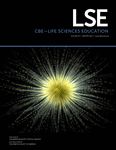Do We Need to Design Course-Based Undergraduate Research Experiences for Authenticity?
Abstract
The recent push for more authentic teaching and learning in science, technology, engineering, and mathematics indicates a shared agreement that undergraduates require greater exposure to professional practices. There is considerable variation, however, in how “authentic” science education is defined. In this paper we present our definition of authenticity as it applies to an “authentic” large-scale undergraduate research experience (ALURE); we also look to the literature and the student voice for alternate perceptions around this concept. A metareview of science education literature confirmed the inconsistency in definitions and application of the notion of authentic science education. An exploration of how authenticity was explained in 604 reflections from ALURE and traditional laboratory students revealed contrasting and surprising notions and experiences of authenticity. We consider the student experience in terms of alignment with 1) the intent of our designed curriculum and 2) the literature definitions of authentic science education. These findings contribute to the conversation surrounding authenticity in science education. They suggest two things: 1) educational experiences can have significant authenticity for the participants, even when there is no purposeful design for authentic practice, and 2) the continuing discussion of and design for authenticity in UREs may be redundant.



